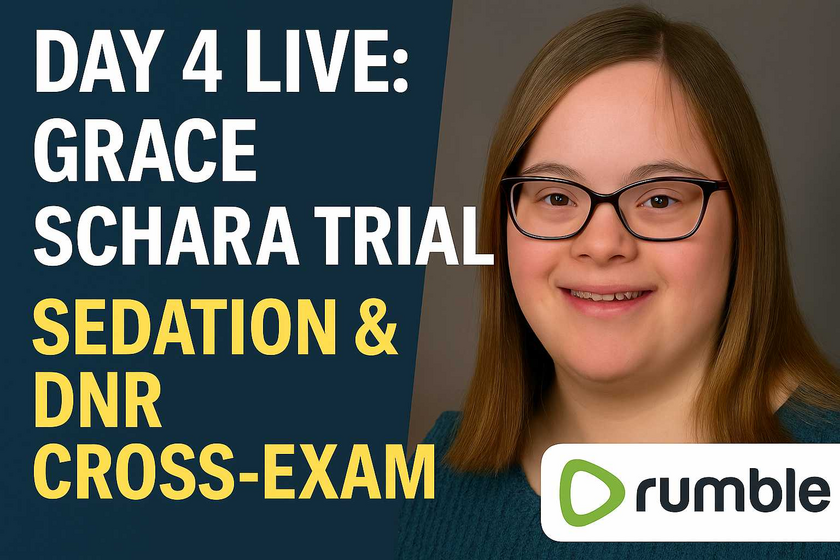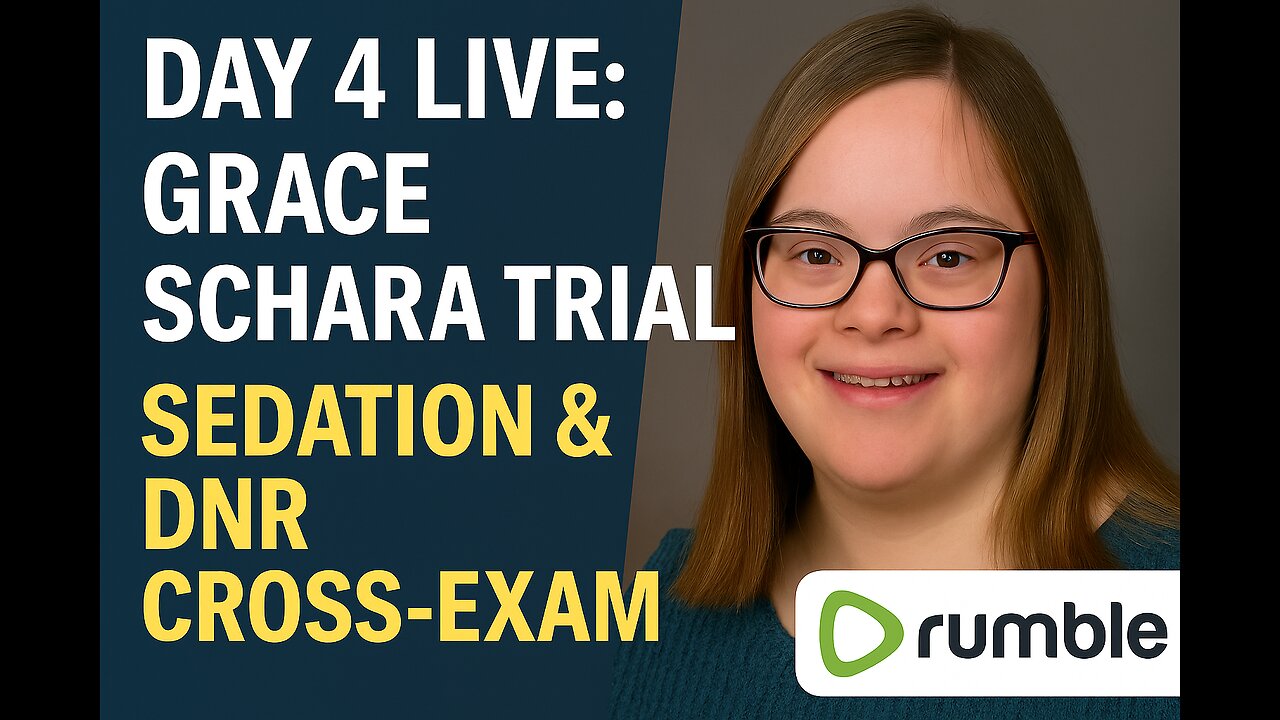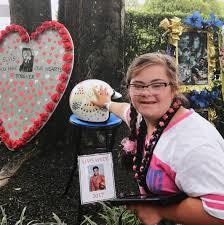I just read the Barnes Brief closing argument on the Grace Schara trial and would like to share my perspective as an RN with 30 years of experience, much of it in critical care.
I always have mixed feelings when the use of sedating medications is debated online. And I was not sure how I would respond to the information that would come out about sweet Grace's situation, though I already knew that @RobertBarnes would really want me on that jury because I knew that even if the hospital had done everything "right," isolating Grace and removing not only her support, but her legal decision makers was not.
But as I read through that opening statement, my horror only grew.
I offer this post as an education for those community members who are not part of the medical model of care. I hope this clarifies any questions you may have about the use of sedation medications in care, as well as the proper use and application of a DNR(do not resuscitate)/DNI (do not intubate) order.
My first point will be that hospitals are the most dangerous places to be when you are sick, no exceptions.
Here is a statement I pulled off Google AI about medical errors:
In the US, estimates suggest that between 44,000 and 440,000 people die each year due to medical errors. These errors, often preventable, can range from medication mistakes to misdiagnosis and failure to act. While some studies put the figure around 250,000, others suggest the number could be as high as 400,000 or even 575,000 according to some experts.
Yep, you got it…we have no idea how many people are actually impacted by medical error. My experience would lean towards the higher numbers, and I worked in some of the most celebrated and honored medical systems in the country.
If you or your loved one ever has to be in the hospital to receive care, make sure that there is always someone there with you/them, and develop relationships with the nurses providing your/their care, if possible. Ask questions, ask them to teach you about any and all medications being given, ask about all tests/scans: why are they needed? Are they needed to determine treatment? What is the expected outcome of the treatment?
Remember, the hospital/doctor is paid no matter what the outcome will be, so there is no systemic motivation to provide the best outcome for the patient.
Now to tackle the more controversial issue: the use of sedation during medical treatment. The first thing to understand about any type of sedation is that it is considered a restraint. Many medical professionals forget this, and so sedation is often over-used. It is easier and cheaper than providing staff or asking family to help with other methods of managing issues. In Grace’s case, staff could have shown Grace’s dad how the cannula needed to sit on Grace’s face, and ask him to adjust it if it gets moved or dislodged. There would be other ways of placing the tubing that is less dependent on her ears. So many options…I’m not sure how many were used for Grace before sedation was ordered, but they do exist. But even well-meaning staff will resort to the easy and the fast when they are stressed, short-staffed, overworked, and underappreciated.
Another rule about sedation is that the provider or nurse should always use the lowest possible dose to achieve the desired effect. Period. If sedation is not helping, other options (like listed above) should be reconsidered. If an individual has an adverse reaction to any sedation, it should be stopped immediately, and noted in the chart as an allergy so other care providers will not use it. I will admit that I have watched these notes be overwritten by doctors, but then they are expected to document their justification for the over-ride.
With all that said, I do want to state that sedation can be a very important and useful tool in someone’s care. Sedation for individuals on a vent is sometimes critical to reduce stress and to allow their body to heal. But it is a delicate balancing act that is as much art as it is science. My last 5 years in practice, I worked in a procedural area administering sedation for procedures. It was just enough to make individuals relax and a little dozy so they would not be so anxious for the procedure, although nearly all of the procedures could have been easily done without any sedation.
There is also the consideration that the sedation could have a paradoxical effect, particularly in the elderly, children, or with individuals like Grace. If anyone approached me about using sedation (even a mild sleeping pill) for any of these types of patients, I always felt like I was playing a bit of Russian Roulette. Sometimes it would work, and I would have a peaceful shift…other times, I would be called by a 911 operator to let me know that someone on my unit was calling claiming that they had been kidnapped and were being held against their will (yes, that really did happen).
My point is that sedation can have an important role in a care plan, but as Robert says, it needs to be a discussion and done with informed consent of the patient and/or their family.
The next major issue is the DNR/DNI order. These are so often misunderstood, not only by patients and families, but by medical personnel. In plain terms, they are very simple. If someone is going into respiratory failure, and ALL other options have been exhausted (there are quite a few before intubation is necessary), don’t intubate. If my heart stops, and I’m not breathing, don’t do CPR or ALS. To be fair, they need to be linked, because if I have to resuscitate you, you will need to be intubated…it’s just how the protocol works to increase chance of survival and recovery. But, I digress…
However, a DNR/DNI order does not restrict ANY treatment available up to that point. It does not restrict the use of narcan to reverse the effects of the morphine. It didn’t restrict other warming mechanisms or supportive therapy to maintain Grace until the sedatives wore off. It NEVER justifies negligence and not assessing any issues with your patient. The denial of treatment to Grace for her symptoms cannot be condoned by that order, even if it was a legitimate order.
The last issue I want to address here is the administration of morphine. In 30 years, I NEVER administered morphine to suppress an elevated respiratory rate. I don’t know that there is any research or study anywhere that would support that as an accepted practice. Yes, that can be a side-effect of morphine, but if that happens, the protocol is to increase respiratory support, administer narcan and continue to monitor the patient until they stabilize. I have given morphine for pain… I have administered morphine as part of a comfort care or hospice plan to manage pain and/or “air hunger” at end-of-life. But it is not acceptable practice in ANY CIRCUMSTANCE to administer morphine to suppress breathing. None…not ever…
I have all sorts of questions about this case, like “Why did Grace end up on a high-flow oxygen cannula when she could have easily gone home on supplemental oxygen?” “Why wasn’t she discharged when she was stable?” “Why wouldn’t any of the staff enter her room to talk with the family?” "Why did she have to have a feeding tube rather than oral intake?" and so many more…I’m sure they will be addressed in more detail during the presentation of the case, but they leave me with so many concerns…
My final point here is that it is not the drugs that are the issue, they are just tools. It is the inappropriate use of these medications, the misunderstanding of what DNR/DNI means, and a lack of compassion, care, concern, and basic standards of practice that created the issues we see in this case (don’t even get me started on the nurse’s order from the MD on vacation).
When I graduated with my BSN, it was a 5 year program, and ranked one of the top programs in the nation at the time. I have watched as over the years, they shorten and simplify nursing education to the point of being nearly worthless as far as true assessment and critical thinking skills go. Then during COVID, we were allowing students who had not even completed the program to act as nurses, unsupervised, in order to meet demand. So many corners were cut, and, unfortunately, lives were lost due to poor, inadequate, inept care.
I deeply regret any part I played during the whole COVID fiasco in limiting family access. Luckily, I had left the ICU setting the October before COVID hit, so did not have to face a situation like Grace's. I refuse to ever participate or condone in what took place in our hospitals EVER again.
If you have any questions, I would be happy to answer them for you. The more we can understand what the options are, the better decisions.





















